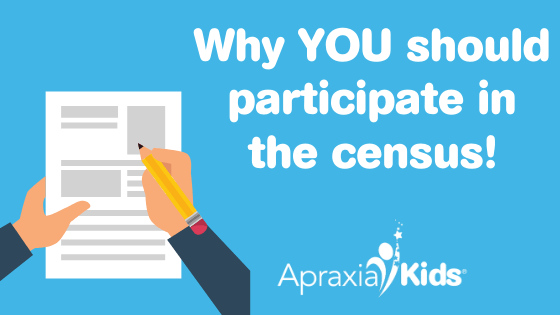
24 Feb Why YOU should participate in the census!
Like every other day, you go to your mailbox and grab your mail. As you flip through the stack of envelopes, you notice a something different. When you open the envelope, you find a survey. It’s filled with questions asking for information about your age, marital status, place of residence, and more. The survey you received is the census.
You may be thinking, “Why should I care about the census?” But as a parent of a child with apraxia of speech, you can’t afford not to care.
Your participation is critical to ensure that your state’s public schools receive the full amount of federal funding that they are entitled to. An accurate census is key to schools getting the funding they need to serve every child who walks through their doors.
Census data is the foundation for allocation of billions of dollars of federal education aid to states and localities. The census results impact the two biggest pots of federal money for K-12 schools: Title I aid for disadvantaged students and special education grants to states. The 2020 Census count impacts the federal funds that communities receive each year for programs and services that are critical for schools, students, and younger children, such as:
- Special education, Head Start, after-school programs, and classroom technology.
- Food assistance, including free and reduced-price school lunches.
- Maternal and child health programs.
If some groups aren’t accurately represented in the census, it will be more difficult for their states to cover the needs that exist in their communities. The schools their children attend will be underfunded, and the resulting lack of resources can negatively affect all students in the school.
The 2020 Census will invite everyone to respond; most households will receive an invitation in the mail, but every household will have the option of responding online, by mail, or by phone.
Learn more at https://2020census.gov/en/what-is-2020-census.html
| WHAT TO EXPECT IN THE MAIL: | |
| March 12-20 | An invitation to respond online to the 2020 Census |
| March 16-24 | A reminder letter to respond online |
| If you haven’t responded yet: | |
| March 26-April 3 | A reminder to respond postcard |
| April 8-16 | A reminder letter and paper questionnaire |
| April 20-27 | A final reminder postcard |
| A Census worker will follow up in person if you have not yet responded | |
Like every other day, you go to your mailbox and grab your mail. As you flip through the stack of envelopes, you notice a something different. When you open the envelope, you find a survey. It’s filled with questions asking for information about your age, marital status, place of residence, and more. The survey you received is the census.
You may be thinking, “Why should I care about the census?” But as a parent of a child with apraxia of speech, you can’t afford not to care.
Your participation is critical to ensure that your state’s public schools receive the full amount of federal funding that they are entitled to. An accurate census is key to schools getting the funding they need to serve every child who walks through their doors.
Census data is the foundation for allocation of billions of dollars of federal education aid to states and localities. The census results impact the two biggest pots of federal money for K-12 schools: Title I aid for disadvantaged students and special education grants to states. The 2020 Census count impacts the federal funds that communities receive each year for programs and services that are critical for schools, students, and younger children, such as:
- Special education, Head Start, after-school programs, and classroom technology.
- Food assistance, including free and reduced-price school lunches.
- Maternal and child health programs.
If some groups aren’t accurately represented in the census, it will be more difficult for their states to cover the needs that exist in their communities. The schools their children attend will be underfunded, and the resulting lack of resources can negatively affect all students in the school.
The 2020 Census will invite everyone to respond; most households will receive an invitation in the mail, but every household will have the option of responding online, by mail, or by phone.
Learn more at https://2020census.gov/en/what-is-2020-census.html
| WHAT TO EXPECT IN THE MAIL: | |
| March 12-20 | An invitation to respond online to the 2020 Census |
| March 16-24 | A reminder letter to respond online |
| If you haven’t responded yet: | |
| March 26-April 3 | A reminder to respond postcard |
| April 8-16 | A reminder letter and paper questionnaire |
| April 20-27 | A final reminder postcard |
| A Census worker will follow up in person if you have not yet responded | |
Credentials:
Hours of Operation:
Treatment locations:
Address:
,
Phone:
Email:
Overall Treatment Approach:
Percent of CAS cases:
Parent Involvement:
Community Involvement:
Professional consultation/collaboration:
Min Age Treated:
Max Age Treated:
Insurance Accepted:




